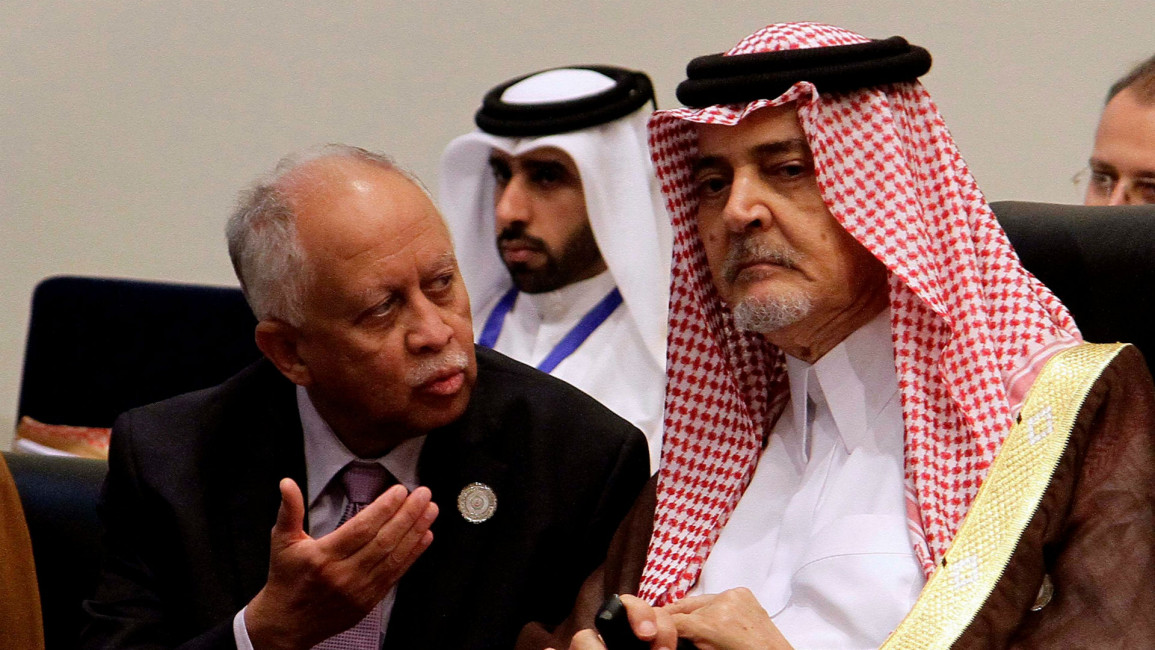
What does Russia want in the Middle East?
What does Russia want in the Middle East?
Comment: Moscow's support for Bashar al-Assad and its approach to the war in Yemen has hurt relations with Arab countries, especially Saudi Arabia, says Mahmoud Rimawi.
2 min read
Saudi Arabia's foreign minister (R) discusses Yemen at the Arab summit (Anadolu)
The Saudi foreign minister, Saud al-Faisal, strongly criticised Russia at the closing of the 26th annual Arab summit earlier this month - slamming Moscow's support for Bashar al-Assad in Syria. Rarely before has Russia faced such criticism at the highest-ranking Arab forum.
A brief message to the summit from Russia's president, Vladimir Putin, repeated his country's stated policy in the region, and called for a political solution in Yemen - a rejection of Saudi-led airstrikes that started in Yemen on 25 March.
These barbs come despite warm public relations between Riyadh and Moscow, as demonstrated by a visit by Faisal to Moscow last November.
However, Moscow has apparent ties with the Houthi movement - officials met Houthi leaders shortly after the fall the Yemeni president, Abd Rabbo Masour Hadi, one of only a few countries to have done so.
The Russian foreign minister, Sergey Lavrov, has called for the Houthis and the Arab coalition to end their military operations and resume peace talks. However, Russia's failure to recognise the legitimate rulers of Yemen has boosted the Houthis.
Faisal criticised Moscow for continuing to supply weapons to Assad's regime in Syria. Russia responded arguing it had done nothing illegal under international law. However, the Saudi foreign minister said that by continuing to arm Assad's regime, Russia is largely responsible for the tragedy of the Syrian people.
He said Syrian cities such as Aleppo, Hama, and Homs, were being bombed with Russian planes using Russian-made rockets.
Discussing the repercussions of the Saudi campaign in Yemen, Lavrov cautioned against the situation turning into an Arab-Iranian war, implying that the Houthis were Iran's proxy in Yemen.
However, he did not explain what the link was between Iran and Yemen. Lavrov could have discussed how Iran had armed and trained the Houthis.
It is strange that Moscow is part of the Iranian axis, and promoting Iran's position at the UN and to western countries. It is also odd that Moscow is prioritising its relations with Tehran over its relations with Arab countries.
Moscow and Tehran have economic interests and neighbourly ties, and they both oppose Sunni militant movements. However, this may not be enough to explain the alliance.
It may reflect their transnational imperialist ambitions. Both see the US as weak and want to take advantage of the situaiton to reduce its regional influence. However, people in the region have become the victims of their ambitions.
This article is an edited translation from our Arabic edition.
A brief message to the summit from Russia's president, Vladimir Putin, repeated his country's stated policy in the region, and called for a political solution in Yemen - a rejection of Saudi-led airstrikes that started in Yemen on 25 March.
These barbs come despite warm public relations between Riyadh and Moscow, as demonstrated by a visit by Faisal to Moscow last November.
However, Moscow has apparent ties with the Houthi movement - officials met Houthi leaders shortly after the fall the Yemeni president, Abd Rabbo Masour Hadi, one of only a few countries to have done so.
The Russian foreign minister, Sergey Lavrov, has called for the Houthis and the Arab coalition to end their military operations and resume peace talks. However, Russia's failure to recognise the legitimate rulers of Yemen has boosted the Houthis.
Faisal criticised Moscow for continuing to supply weapons to Assad's regime in Syria. Russia responded arguing it had done nothing illegal under international law. However, the Saudi foreign minister said that by continuing to arm Assad's regime, Russia is largely responsible for the tragedy of the Syrian people.
He said Syrian cities such as Aleppo, Hama, and Homs, were being bombed with Russian planes using Russian-made rockets.
Discussing the repercussions of the Saudi campaign in Yemen, Lavrov cautioned against the situation turning into an Arab-Iranian war, implying that the Houthis were Iran's proxy in Yemen.
However, he did not explain what the link was between Iran and Yemen. Lavrov could have discussed how Iran had armed and trained the Houthis.
It is strange that Moscow is part of the Iranian axis, and promoting Iran's position at the UN and to western countries. It is also odd that Moscow is prioritising its relations with Tehran over its relations with Arab countries.
Moscow and Tehran have economic interests and neighbourly ties, and they both oppose Sunni militant movements. However, this may not be enough to explain the alliance.
It may reflect their transnational imperialist ambitions. Both see the US as weak and want to take advantage of the situaiton to reduce its regional influence. However, people in the region have become the victims of their ambitions.
This article is an edited translation from our Arabic edition.




